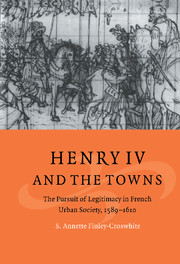Book contents
- Frontmatter
- Contents
- List of illustrations
- List of tables
- Acknowledgements
- Introduction
- 1 France in the 1580s and 1590s
- 2 Brokering clemency in 1594: the case of Amiens
- 3 Henry IV's ceremonial entries: the remaking of a king
- 4 Henry IV and municipal franchises in Catholic League towns
- 5 Henry IV and municipal franchises in royalist and Protestant towns
- 6 Clientage and clemency: the making of municipal officials
- 7 Urban protest in Poitiers and Limoges: the pancarte riots
- 8 Municipal finance and debt: the case of Lyons
- Conclusion: Henry IV, urban autonomy, and French absolutism
- Bibliography
- Index
- CAMBRIDGE STUDIES IN EARLY MODERN HISTORY
8 - Municipal finance and debt: the case of Lyons
Published online by Cambridge University Press: 02 November 2009
- Frontmatter
- Contents
- List of illustrations
- List of tables
- Acknowledgements
- Introduction
- 1 France in the 1580s and 1590s
- 2 Brokering clemency in 1594: the case of Amiens
- 3 Henry IV's ceremonial entries: the remaking of a king
- 4 Henry IV and municipal franchises in Catholic League towns
- 5 Henry IV and municipal franchises in royalist and Protestant towns
- 6 Clientage and clemency: the making of municipal officials
- 7 Urban protest in Poitiers and Limoges: the pancarte riots
- 8 Municipal finance and debt: the case of Lyons
- Conclusion: Henry IV, urban autonomy, and French absolutism
- Bibliography
- Index
- CAMBRIDGE STUDIES IN EARLY MODERN HISTORY
Summary
In 1609 a deputy from Bayonne, M. de Lèspes de Hureaux, intruded on Henry IV in the gardens at Fontainbleau and begged him to revoke an edict establishing royal control over customs taxes in the city. The king had been peacefully feeding some ducks, and he bluntly told the man to go away. Lèspes de Hureaux persisted, however, explaining that his town was too poor to pay more taxes. Henry rebuked the man by saying that at least thirty bourgeois in Bayonne were wealthier than its governor. Turning towards a secretary, the king declared, ‘They are rich … and three-hundred of their bourgeois wear silk.’ He then chided the deputy, ‘You are glorious and employ your time dancing and making merry.’ The king ended the conversation by adding, ‘Imagine, former kings granted octrois to the towns to be used for upkeep, but over the ages they have converted these taxes into their own personal profit.’
Henry and his finance minister, the duke of Sully, firmly believed that town councillors misappropriated funds from municipal octrois and overburdened those who paid city taxes with too many demands. Both men accused the towns of financial corruption. To ensure that royal tax monies ended up in the king's coffers and not in magisterial pockets, the minister used his power to inspect municipal budgets and exert tighter control over municipal finances. The Wars of Religion had created debt and taxation problems that caused the king and his minister to investigate the municipal use of tax monies. After the wars ended, the Crown involved itself closely in municipal financial affairs in order to encourage greater financial efficiency and liquidate war debts.
- Type
- Chapter
- Information
- Henry IV and the TownsThe Pursuit of Legitimacy in French Urban Society, 1589–1610, pp. 162 - 181Publisher: Cambridge University PressPrint publication year: 1999



